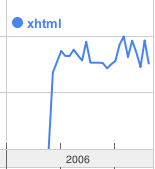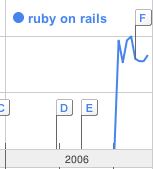Career
Outsourcing Web 2.0 – Computer Science Trend analysis
So you are in pursuit of a Computer Science degree at the University of your choice. Still thinking it’s a great field for a career, since the original dot-com bubble, waves of new students hit the books and compilers each year. And while Google’s stock prices and numerous Web 2.0 companies are pumping up a new bubble for the technology industry, a new concern enters future graduate’s mind – IT job outsourcing to India. A rapidly developing country, with over one billion people, is looking to take on more than just tech-support call centers, and are willing to program code for less.
If Google Trends offer a viable representation of technological activities over the last 3 years, then we might be facing a very different job market in just a few years from now.
Typically, the perception was that only tedious, basic coding of large enterprise projects was outsourced, as well as most of the testing and quality assurance.
And as the normalized graphs above show, PHP – language typically associated with web development, shows a stronger position in Canada and United States than in India, when compared to heavier Java. Though thinking that we’ll get to keep all the economic benifits of the web bubble 2.0 is foolish.
A closer look reveals an interesting trend. The breakdown of PHP, JavaScript, and CSS in Canada and United States, correspond to the makeup of a full Web Application. Though the India is very heavy on the JavaScript, and severely lacks in actual styling with CSS. From this, I conclude a few things:
- North America is capable of building full Web Applications domestically
- India programs the parts outsourced to their centers (in this case JavaScript)
- Most designers are still North American
So can we take comfort and security in being well balanced, artistic, able to communicate well, and experienced with cutting edge technology? We shouldn’t.
India is playing the catch-up game, and seems willing to pick up whatever technological requirement is thrown, fast! XHTML standards have been searched for by Canadian and United States developers at relativly stable levels over the last 3 years. The latest buzz in Web 2.0 – Ruby on Rails, has been steadily climbing up in popularity since early 2005 in United States, and mid-2005 in Canada. Amazingly, both have simply appeared in Indian searches, as if someone has flipped a switch.
So what kind of a competitive advantage are we left with? I would like to say passion and love for programming. We don’t have exclusive textbooks, or rare hardware not available to Indian students. And looking at the trends, Indian Universities might easily offer higher salaries to international professors of popular programs. If you are going into the Software Development field just because you’ve heard there are money involved, there is little separating you from a lecture-hall full of students at an Indian University. Well there’s one – they are willing to take your job for much less pay.
I program because I enjoy it. I get excited over figuring out neat ways of solving complicated problems. I contribute to Open Source projects, just to write more code. I aim for personal success, and believe that income will come as a side-effect.
Pursue what you enjoy, success will come with excellence.
– Tony










[...] While trends do indicate rapid outsourcing of programming positions, the Bureau of Labor Statistics indicated that United States’ companies are creating new domestic IT jobs at a faster rate, as requirement for computer skills increase in new fields such as construction, and healthcare. Some of the emotional challenges people faced during the Industrial Revolution are similar to what we are experiencing today, Vardi said. We are undergoing a period of change, and it is best to accept it, he said. “Offshoring is like the winter. You don’t ask if it is good or bad—you ask what do you do about it. The answer is you dress warmly.†[...]